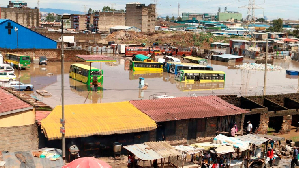- Home - News
- TWI News | TV
- Polls
- Year In Review
- News Archive
- Crime & Punishment
- Politics
- Regional
- Editorial
- Health
- Ghanaians Abroad
- Tabloid
- Africa
- Religion
- Election 2020
- Coronavirus
- News Videos | TV
- Photo Archives
- News Headlines
- Press Release
General News of Tuesday, 19 July 2005
Source: PA
Debt Cancellation in Name Only
Accra -- A new report by Jubilee Debt Campaign, ActionAid and Christian Aid has warned that 60 low-income countries, most of them in Africa will need total debt cancellation if they are to meet the Millennium Development Goals by 2015.
The report said multilateral debt cancellation for these countries would release over $10 billion each year for poverty reduction, rather than the $742 million which according to estimates would be released by the G8 proposal in 2005.
The report highlights, what it called "unacceptable conditions", which poor countries have to meet before qualifying for debt cancellation too stringent.
The conditions depend on a drawn-out process of compliance with all the economic policy conditions contained within the HIPC scheme. These include, for instance, cuts in health and education spending, trade liberalisation and privatisations of government-run industries. According to the report, the situation on the ground shows that these conditions often harm recipient country economies. They also undermine democracy in poor countries, by denying elected parliaments or civil society a say in important decisions about the country's economic programmes.
The report said though the 18 countries whose debts have been cancelled will apparently not have to comply with further conditions, their access to funding from multilateral institutions is still dependent on compliance with conditions.
"For any other countries to qualify, they will have to complete the HIPC initiative, and comply with all the conditions it includes."
It says linking total cancellation of World Bank and IMF debts to the HIPC scheme makes it even more desirable to reach Completion Point, potentially reinforcing the strength of conditions.
The report points out that though the total debt cancelled is $40 billion, and could potentially rise to $55 billion, it is only in name, since its true value will not benefit the countries in the long run.
"The deal is presented as being worth $1 - $2 billion a year in cancelled debt service. Our figures indicate that - for the 18 qualifying countries - it cancels the debt service of $742 million in 2005, rising to around $1 billion by 2008.
The report notes that If all 38 HIPC-eligible countries qualified today, the deal would only release about $16.5 billion over 11 years (averaging $1.5 billion a year). "This is a significant amount, which could have a real impact on poverty reduction - but it still falls far short of the more than $10 billion a year needed from multilateral debt cancellation on our analysis of Millennium Development Goals financing needs."
The NGOs are worried that the deal does not include other multilateral debts. The four non-African qualifying countries have debts outstanding to the Inter-American Development Bank which will cost them $216 million in debt service in 2005 ($3 billion over 10 years). Other countries which could potentially qualify in future owe large debts to other multilateral institutions such as the Asian Development Bank.
Opinions









